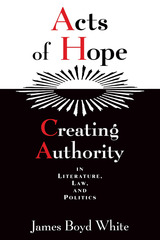
In this book, James Boyd White shows how texts by some of our most important thinkers and writers—including Plato, Shakespeare, Dickinson, Mandela, and Lincoln—answer these questions, not in the abstract, but in the way they wrestle with the claims of the world and self in particular historical and cultural contexts. As they define afresh the institutions or practices for which they claim (or resist) authority, they create authorities of their own, in the very modes of thought and expression they employ. They imagine their world anew and transform the languages that give it meaning.
In so doing, White maintains, these works teach us about how to read and judge claims of authority made by others upon us; how to decide to which institutions and practices we should grant authority; and how to create authorities of our own through our thoughts and arguments. Elegant and accessible, this book will appeal to anyone wanting to better understand one of the primary processes of our social and political lives.

With socialism in eclipse and market economies gaining acceptance worldwide, a new kind of ethics is needed to address social injustice and inequity. Richard C. Bayer debunks the present direction of mainstream social ethical theory by advancing market systems themselves as a means toward promoting justice and meeting human needs.
Observing that the primary vehicle for Christian ethics since the New Deal has been the welfare state, Bayer argues instead that market systems can provide a basis for reconciling capitalism and Christianity in both theory and practice. He proposes Christian personalism as an ethical approach that emphasizes the dignity of the human person and promotes the achievement of personal development through participation in a modified market economy.
Bayer's work draws on Catholic social thought and orthodox economics, adopting a post-Keynesian approach that deemphasizes the role of the state in the achievement of economic justice. As an example of a personalist economic reform agenda, he describes a "share economy" that advances solidarity among workers, promises greater economic efficiency, and increases employee participation in profit-sharing and decision-making.
Capitalism and Christianity integrates moral arguments with economic analysis to challenge prevailing thought in contemporary Christian social ethics. By incorporating key insights of liberalism while providing constructive criticism of that perspective, it creatively addresses both personal development and the common good.
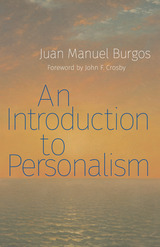
Juan Manuel Burgos shows the reader how personalist philosophy was born in response to the tragedies of two World Wars, the Great Depression, and the totalitarian regimes of the 1930s. Through a revitalization of the concept of the person, an array of thinkers developed a philosophy both rooted in the best of the intellectual tradition and capable of dialoguing with contemporary concerns.
Burgos then delves into the potent ideas of more than twenty thinkers who have contributed to the growth of personalism, including Romano Guardini, Gabriel Marcel, Xavier Zubiri, and Michael Polanyi. Burgos’s encyclopedic knowledge of the movement allows for a concise and well-rounded perspective on each of the personalists studied.
An Introduction to Personalism concludes with a synthesis of personalist thought, bringing together the brightest insights of each personalist philosopher into an organic whole. Burgos argues that personalism is not an eclectic hodge-podge, but a full-fledged school of philosophy, and gives a dynamic and rigorous exposition of the key features of the personalist position.
Our times are marked by numerous and often contradictory ideas about the human person. An Introduction to Personalism presents an engaging anthropological vision capable of taking the lead in the debate about the meaning of human existence and of winning hearts and minds for the cause of the dignity of every person in the 21st century and beyond.
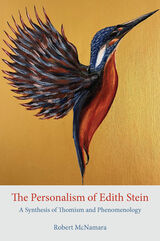
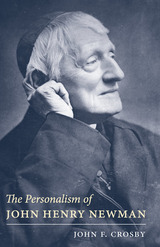
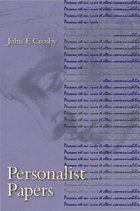

important to understand what constitutes a person. What are the medical,
ethical, moral, mental, legal, and philosophical criteria that determine
protectable human life?
Following immediately on the publication of his highly praised book Choosing
Who's to Live, James Walters addresses with depth and wisdom another
ambitious and complicated matter: determining the nature of personhood.
By providing a much-needed religious/philosophical context for the discussion--examining
contemporary thinking on just what constitutes valuable life--Walters
broadens his inquiry beyond the human to include other animals and deals
with the phenomenon of anencephalic infants, those who are born without
higher brains.
Searching for a measurable and humane standard of personhood, Walters
looks at the current definition of it and declares it inadequate--offering
instead the idea of proximate personhood, with criteria for helping to
determine which individuals possess a unique claim to life.
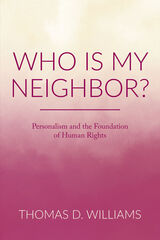
READERS
Browse our collection.
PUBLISHERS
See BiblioVault's publisher services.
STUDENT SERVICES
Files for college accessibility offices.
UChicago Accessibility Resources
home | accessibility | search | about | contact us
BiblioVault ® 2001 - 2024
The University of Chicago Press









